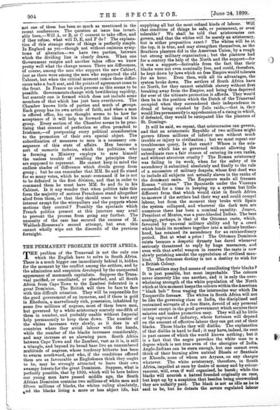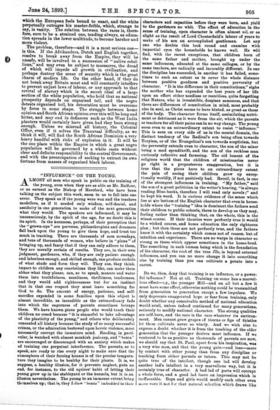THE PERMANENT PROBLEM IN SOUTH AFRICA.
THEproblem of the Transvaal is not the only one which the English have to solve in South Africa. There is a much bigger one immediately behind it, hidden for the moment by the conflict among the settlers, and by the admiration and suspicion developed by the unexpected appearance of mammoth capitalists. Suppose the Trans- vaal pacified, or conciliated, or absorbed, and all South Africa from Cape Town to the Zambesi federated in a great Dominion. The British will then be face to face with this difficult situation. They will be responsible for the good government of an immense, and if there is gold in Rhodesia, a marvellously rich, possession, inhabited by some five millions of negroes, most of them brave men, but governed by a white aristocracy scarcely one-fifth of them in number, and probably unable without Imperial help permanently to keep them down. The number of the whites increases very slowly, as it does in all countries where they avoid labour with the hands, while the number of the blacks increases considerably, and may increase at an alarming pace. South Africa between Cape Town and the Zambesi, vast as it is, is still a triangle, and beyond its broad base live an unnumbered multitude of negroes, whose tendency hitherto has been to swarm southward, and who, if the conditions offered them are as favourable as Englishmen think they ought to be, may be strongly attracted to leave their own swampy forests for the great Dominion. Suppose, what is perfectly possible, that by 1930, which will be here before our young men have passed middle age, the South African Dominion contains two millions of white men and fifteen millions of blacks, the whites ruling absolutely, and the blacks living a more or less abject life, but supplying all but the most refined kinds of labour. Will that condition of things be safe, or permanent, or even* tolerable ? We shall be told that aristocracies can govern, and that the whites will be merely an aristocracy, but is either proposition exact ? The whites will be at. the top, it is true, and may strengthen themselves, as the Southern planters did in the American Union, by a rough but strong military organisation ; but the planters had for a century the help of the North and the support—for it was a support—derivable from the fact that their blacks were not even nominally free, and could, therefore, be kept down by laws which no free Empire would tolerate for an hour. Even then, with all its advantages, the system broke down. The settlers of South Africa have no North, for they cannot establish slavery without first breaking away from the Empire, and being thus deprived for ever of the ultimate protection it affords. They would then be in the position which the Dutch of the Transvaal occupied when they surrendered their independence in dread of being crushed by Zulu raids,—that is, they would live permanently in apprehension of a rising in which, if defeated, they would be extirpated like the planters of St. Domingo.
It will be said, we repeat, that aristocracies can govern, and that an aristocratic Republic of two millions might govern fifteen millions of inferior men without much trouble or injury to civilisation ; but we must repeat our troublesome query, Is that exact? Where is the aris- tocracy which has so governed without allowing the subordinate race a fair chance of entering its own ranks, and without atrocious cruelty ? The Roman aristocracy was failing in its work, when for the safety of its ascendency it submitted absolutely and finally to the rule of a succession of military despots, whose first deed was to include all subjects not actually slaves in the ranks of the dominant caste. The Emperors made all freemen Roman " citizens." The Spaniards under the Viceroys succeeded for a time in keeping up a system but little different from that which would exist in South Africa to-morrow if the settlers had their way and could compel labour, but from the moment they broke with Spaiu the system collapsed, and wherever the dark men are numerous there has been a nominal equality. Juarez, President of Mexico, was a pure-blooded Indian. The best analogy, perhaps, is that of the Ottoman caste, which, favoured by unusual military ability and by a creed which binds its members together into a military brother- hood, has retained its ascendency for an extraordinary period. But at what a price 1 The Ottoman Dominion exists because a despotic dynasty has dared whenever seriously threatened to reply by huge massacres, and even with that awful weapon in reserve the caste is now slowly perishing amidst the opprobrium of civilised man- kind. The Ottoman destiny is not a destiny to wish for a British Colony.
The settlers may find means of conciliating their blacks ? It is just possible, but most improbable. The colours never sincerely like one another, and it is only the over- whelming strength of the white population of the North which at this moment keeps the colours within the American " black belt " from waging the internecine war which De Tocqueville foresaw. The whites in South Africa will not be like the governing class in India, the disciplined and restrained servants of a free State, devoid of any personal interest except in the good government which secures their salaries and makes promotion easy. They will all be little or big captains of industry, whose fortunes will depend on the amount of effective labour they can get out of their blacks. Those blacks they will dislike. The explanation of that dislike is hard to find ; it may have, indeed, its root in past causes of which the world knows nothing; but it is a fact that the negro provokes the white man to a degree which is not true even of the aborigine of India. Anglo-Indians can be stern enough, but one cannot even think of their burning alive untried Bheels or Sonthals or Khonds, none of whom are Aryans, on any charges whatever. The white aristocracy, therefore, in South Africa, impelled at once by desire of money and by colour- • rancour, will, even if well organised, be harsh ; while the blacks will nourish a hatred founded originally on race, but kept up by a suspicion that besides being overworked they are unfairly paid. The black is not as idle as he is said to be, but he detests the severe regulated, labour which the European feels bound to exact, and the white perpetually outrages his master-foible, which, strange to say, is vanity. The relation between the races is, there- fore, sure to be a strained one, tending always, as educa- tion spreads in the lower multitude, to become harsher and more violent.
The problem, therefore—and it is a most serious one— is this. If the Afrikanders, Dutch and English together, resolve to break away from the Empire, they will be unsafe, will be involved in a succession of " native rebel- lions," and may even be subject to massacres, the dread of which will impede all growth in civilisation, and perhaps destroy the sense of security which is the great charm of modern life. On the other hand, if they do not break away Britain must and will constantly interfere to prevent unjust laws of labour, or any approach to that revival of slavery which is the secret ideal of a large section of the white population, who hold that as national prosperity depends on organised toil, and the negro detests organised toil, his detestation must be overcome by force in some shape. The struggle between home opinion and South African opinion over this will be long and bitter, and may end in defiances such as the West India planters would certainly have given had they been strong enough. Unless we misread all history, the Colonial Office, even if it solves the Transvaal difficulty, as we think it will, will find the South African Dominion a very heavy handful with risks of explosion in it. It will be the one place within the Empire in which a great negro population will be governed by a white caste without clear and definite responsibility to the central Government, and with the preoccupation of seeking to extract its own fortune from masses of organised black labour.



















































 Previous page
Previous page